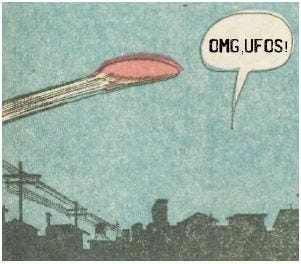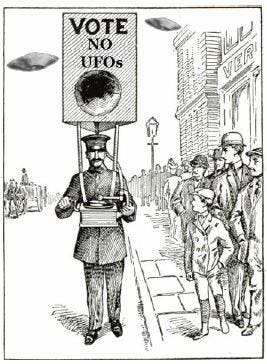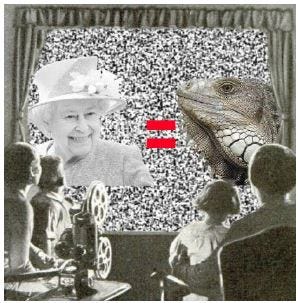Empty Bleachers
Where we yell to no one about things that probably don't matter.
OMG, UFOS!
The government’s latest attempt to investigate UFOs has elicited diverse reactions from the UFO community (such as it is). The defense bill approved by Congress decreed that the short-lived UAP Task Force must pass the torch to a newly created Airborne Object Identification and Management Synchronization Group (AOIMSG). (The name isn’t suited for a catchy acronym, so we’ve taken to calling it OMGUFOS!)
Some observers view the development as a step towards Disclosure; others take umbrage with the fact that it’s nestled under the watchful eye of the Department of Defense. The battle boils down to a conflict between civilian vs. military oversight—with the likes of Dr. Steven Greer, Luis Elizondo, and MUFON lining up against the proposed reporting structure. Their main concern with placing OMGUFOS! under DoD supervision is that any discoveries will be hidden by the same bureaucrats that have been obfuscating UFO truth for decades. They’re urging lawmakers to include civilian scientists and experts to ensure transparency.
We should know the results of this redundant exercise by Halloween 2022—that’s when OMGUFOS! has to deliver their annual unclassified report. In the end, it likely won’t matter which agency supervises the program—any worthwhile revelations will still be concealed beneath the inky shade of the federal government’s umbrella of secrecy.
Hell No, UFOs!
Take me to your leader? Maybe not, if one of Roswell’s mayoral candidates had gotten his way. Guy Malone is fed up with the UFOs that have ‘invaded’ for the past 70 years and feels that the town’s identity has been ‘abducted’ by the topic. When ‘probed’ about his concerns, he cited the fleeting nature of tourism as a long-term problem, proposing instead that constituents need a ‘close encounter’ with more stable initiatives (like Roswell-owned bitcoin mining facilities).
It’s safe to say Guy isn’t a believer. He gives a lecture about what he thinks happened during the 1947 crash in the New Mexico desert, attributing the event to Nazi scientists running high-altitude experiments as part of Project Paperclip, and not beings from another planet.
While the February election resulted in the unseating of Roswell’s incumbent candidate, Malone wasn’t his chosen replacement—he finished in third place with a total of 528 votes.
We aren’t surprised that his ideas didn’t fly in a city whose slogan is “we believe”—especially in the midst of revived UFO interest, a 75th anniversary of the famous saucer crash on the horizon, and an eager public ready for a road-trip after experiencing two years of ‘missing time.’ Roswell’s reputation is synonymous with a worldwide phenomenon, and that’s something that transcends politics.
Suspicious Minds
The Philadelphia Inquirer recently ran an article about belief in conspiracy theories (“Penn researchers study why conspiracy theories are so believable”), suggesting that people buy into them largely due to feelings of anxiety and a disinterest in facts. Meanwhile, the authors of the book being profiled admitted that they relied heavily on Twitter for source material—the bastion of calm discourse and factual information.
In a conclusion that should apply to echo-chambers on both sides of the partisan divide, researcher Kathleen Jamieson blamed the proliferation of conspiracy theories on a mechanism present in every news organization except maybe C-SPAN: “The media outlets that advance an ideology are more likely to then spread and legitimize the conspiracy theory because it is consistent with the views of their audience.”
Unfortunately, the study is severely limited by its scope, as the researchers excluded conspiracies popular with the left-leaning corporate media and fixated only on the other end of the political spectrum.
To their credit, they conceded that “conspiracy theories are not always marginal and pathological and that some suspicion about the government and the powerful may be beneficial for democracy.” An admirable admission, but we can be sure that they aren’t referring to theories of the David Icke variety.











